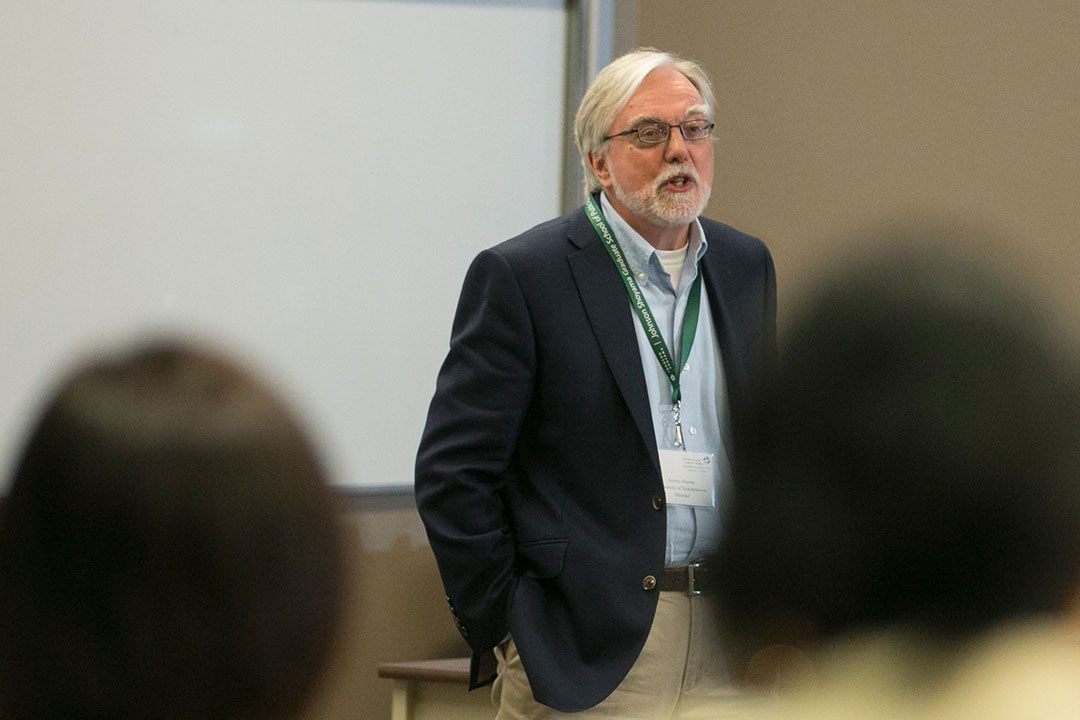
Celebrating public policy school’s anniversary
In 2007, the University of Saskatchewan and the University of Regina did what some institutions may have thought impossible by creating a single, provincial public policy school.
By Erica Schindel“At the time, the creation of one single school may have seemed very ambitious,” said Michael Atkinson, professor and then-executive director back in 2007. “However, with the support of our two institutions, the excitement of our faculty, and the motivation of our staff, the school was able to create a sense of community built on the principles of collaboration, hard work and dedication.”
In the beginning, the school offered two graduate programs: Master of Public Administration (MPA); Master of International Trade (MIT); and a master’s certificate program. With 114 MPA and 20 master’s certificate students enrolled at the U of R campus and 17 MPA and 18 MIT students at the U of S campus, the school was off to a good start.
Today, JSGS offers five graduate programs: Master of Public Policy (MPP); Master of Health Administration (MHA); and the Doctor of Philosophy in Public Policy; as well as five master’s certificates and a number of executive education options. The success of the MHA program has increased the school’s student body by 24 per cent, while the adoption of competency-based learning in the MPA demonstrates commitment to program demand and quality.
Over the past decade, JSGS has experienced a steady increase in the number of student applications, from 280 in 2010-11 to 620 in 2014-15, has placed over 160 students in the executive internship program (with a 90 per cent rate of transition to employment), graduated over 700 alumni, and was granted accreditation for the MPA and MPP programs through the Canadian Association of Programs of Public Administration. Also, the Executive Education program has been successful with 375 participants achieving a certificate of completion for the Policy Workshop Series and 244 receiving professional director certification.
In addition to their classroom contributions, JSGS faculty members are engaged in research that has a high impact on issues affecting citizens of Saskatchewan, Canada and the global community. Working alongside colleagues across academia and in the public service and industry, JSGS faculty have advanced knowledge related to innovation, science and technology policy, social policy and inequality, and governance.
“As the only policy school in Canada with two Tier 1 Canada Research Chairs, one Cisco System Research Chair in Big Data and Open Government, and one Co-operative Retailing System Chair in Co-operative Governance, we are seen as a serious player in the policy research space,” said Jeremy Rayner, director, U of S campus. “The school has attracted almost $11 million in externally, peer-reviewed research funds, has yielded over 35 peer-re- viewed books and almost 200 peer-reviewed journal articles. Our 21 faculty members have been very busy over the past decade, and I don’t see them slowing down anytime soon, especially with the most recent launch of the Centre for the Study of Science and Innovation Policy.”
With continued commitment to collaboration, creativity, diversity and relevance, the school has identified three intersecting directions that will guide planning, programming, student recruitment and faculty hiring: innovation, Indigenization and internationalization.
“Innovation is a cornerstone of the school. Going forward, we will continue to be leaders in inno- vative graduate education, research and engagement, and will look within our capacity to support the incubation of new ideas to address the complex problems that face society,” said Kathleen McNutt, JSGS executive director.
Now, with more than 700 alumni, JSGS is planning to celebrate its 10th anniversary with a gala event this fall.
Erica Schindel is a communications specialist with the Johnson Shoyama Graduate School of Public Policy.

